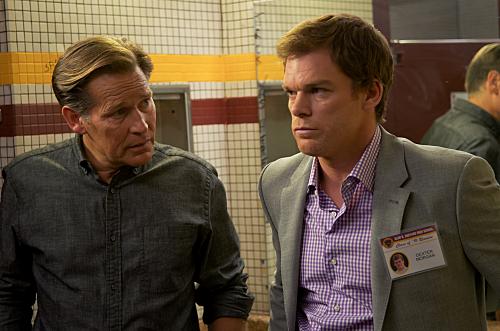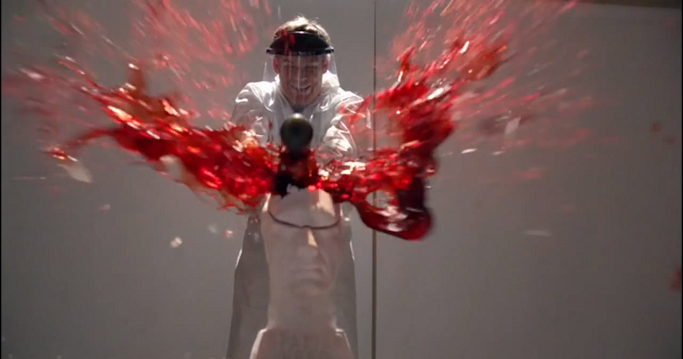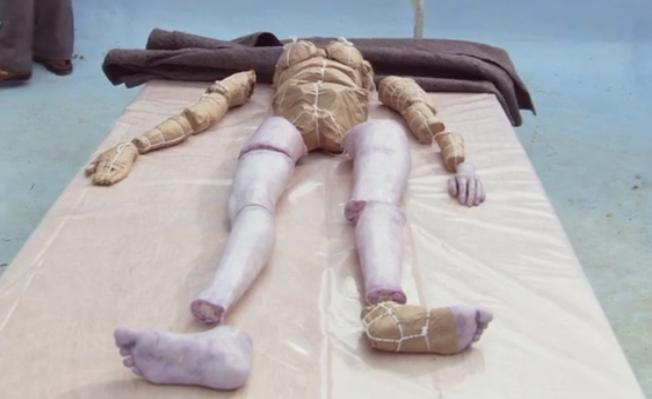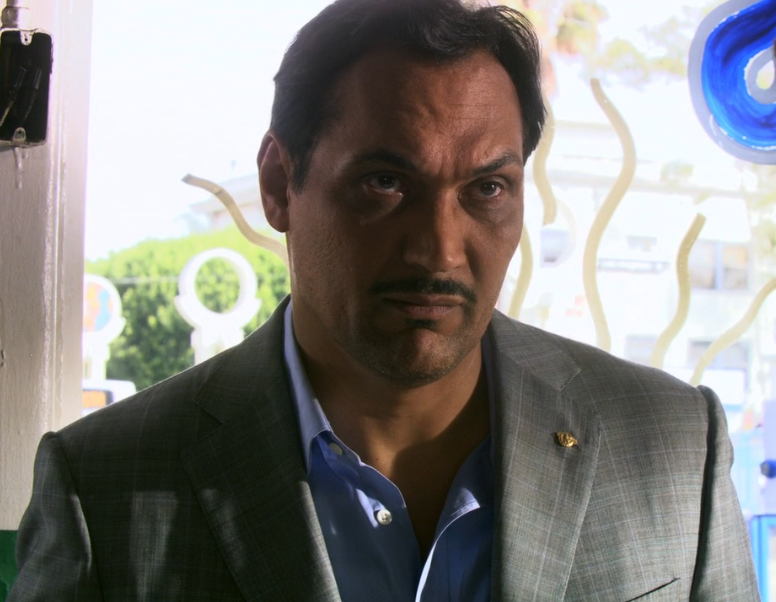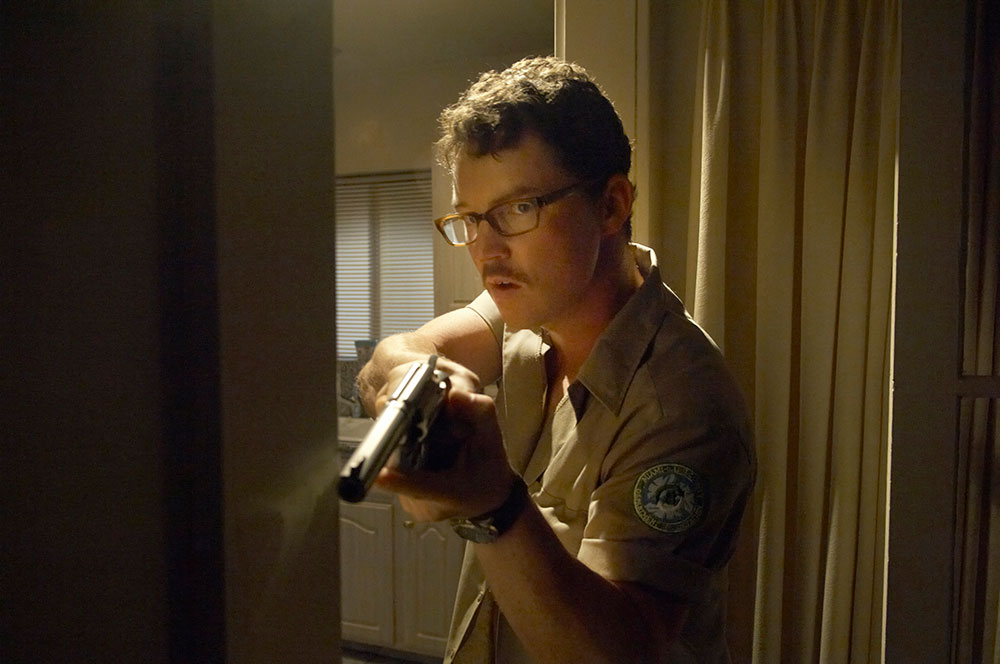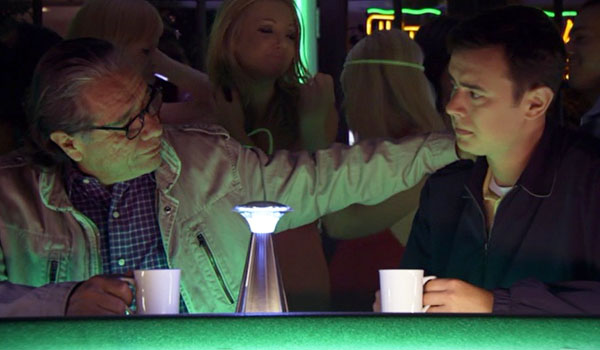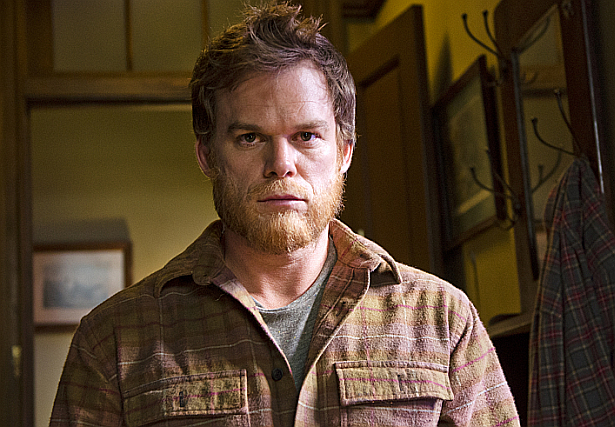Small-Screen 66 – #50: Dexter
(Showtime, 2006-13)
“Tonight’s the night. And it’s going to happen again and again.”
We crack the Top 50 (God, that meant a lot more when I was doing 100 of these) with the show that introduced me to the wonders of Contemporary Cable Drama…and binge-watching. It was a dangerous combination.
I first watched Dexter as part of a class in detective fiction my junior year of college. In addition to assigning Jeff Lindsay’s novel Darkly Dreaming Dexter, the professor (actually a young graduate student) showed us the first two episodes of the Showtime adaptation. At the end of the period, he let us know that Seasons 1 and 2 were currently available on Netflix…
I had first subscribed to Netflix a year earlier, as a sophomore, when I began taking college film courses. But aside from watching a few Spike Lee movies for class (as well as old favorites Hook and Jumanji), I never really “got into it” at the time, and somehow managed to avoid falling victim to the crippling scourge of Netflix addiction.
Now, that was all about to change.
The final piece of the lethal puzzle fell into place when I passed a booth outside the dining hall and discovered that a troop of Girl Scouts was selling cookies on campus. I grabbed one box each of the Samoas, Thin Mints, and Lemon Chalet Creams, and headed for my dorm.
Over the next two weeks, I’d be back three more times. By the final lap, I could eat an entire box of Lemon Chalets (18 cookies in two plastic tubes) at a sitting.
Yeah, it was bad. But the show was good.
As I mentioned in the blurb on American Psycho which ended my Film Favorites series, Dexter follows Dexter Morgan, a forensics technician who moonlights as a serial killer. Like Patrick Bateman, Dexter adopts a facade of normalcy, while claiming to feel no real emotions beneath (as in American Psycho, Dexter clues us in on his thoughts and “feelings” via internal monologue). To blend in and better hide his “monstrous” nature, Dexter explains, he cultivates something akin to friendship with his coworkers, and even maintains a relationship with his girlfriend, Rita.
Unlike Patrick Bateman, however, Dexter’s urge to kill is tempered by a redeeming wrinkle: He only murders other murderers, and only once he’s confident they intend to kill again. As a serial killer hunting serial killers, Dexter becomes simultaneously an apex predator and a kind of macabre superhero. He learned this “Code” from his adopted father, police officer Harry Morgan. After identifying a young Dexter’s sociopathic tendencies, Harry taught his son to “use his powers for good,” so to speak. Additionally, as a cop, Harry coached Dexter on investigation protocol and offered tips on destroying evidence and evading detection. And even after his death, a spectral Harry lingers with Dexter, counseling him as he carries out his kills.
Secretly serving as a morbid Mr. Miyagi of murder didn’t give Harry much time to focus on his biological daughter, Debra. In an attempt to earn the approval of her ostensibly aloof dad, “Deb” Morgan became a cop, and now works alongside her brother in the ranks of the (fictional) Miami-Dade Police Department. And so she toils on, overshadowed by Dexter’s “genius,” attempting to solve homicides even as he commits them.
That’s right: This is one of those shows with a criminal protagonist who has familial ties to the law enforcement body hunting him. Three such shows will appear in this Countdown…but the other two ranked far higher.
Consider the rest of my post a treatise on why this one didn’t.
Actually, that’s a bit harsh. Dexter does some things very well. Key among these are three alliterative components: Setting, Score, and Cinematography. All three work seamlessly together to create a vivid, lurid world for Dexter and his dark deeds.
Miami makes a great choice of setting. Maybe it’s not entirely unique, but seeing as I’ve never actually watched C.S.I.: Miami or Miami Vice, it feels that way. At the very least, it’s a marked departure from the abundance of series set in New York, San Francisco, and Chicago. Additionally, Miami’s tropical climate and location allow for a wide variety of situations. Dexter doesn’t need to head too far out of his way to go from the big city to the Everglades to the open seas. Swinging nightclubs, seedy alleys, and alligator-infested swamps all abound, presenting a variety of ways for Dexter to stalk his prey (and avoid his friends and family).
The setting also provides the opportunity for a spicy, Latin-American-flavored soundtrack, and this opportunity is seized with gusto. Musical selections often reflect Miami’s large Cuban population, with tracks taken from the historic Buena Vista Social Club recordings and other famous Cuban performers. One of my favorite pieces is “Conoci la Paz,” a sort of leitmotif for Dexter’s boat, the Slice of Life. Dexter uses the boat to dispose of his dismembered victims after a successful “workday,” and the tune’s title fittingly translates as “I have met peace.”
Another leitmotif which crops up frequently is the “Blood Theme,” a haunting melody incorporating a string ensemble, piano, and vocal sounds. The tune heightens the effect of creepy moments throughout the series, and also serves as the end credits music after every episode.
In addition to sounding great, the series looks fantastic. Dexter was the first television series to specifically wow me with its cinematography. Although it’s commonplace now for cable drama to resemble Hollywood films in look and scope (and had been for some years beforehand), I had never seen anything like it before, and the shift came as a revelation. The night scenes, when Dexter does most of his hunting, look particularly great. The interplay of light, shadow, and the garish colors of Miami nightlife creates a perfect backdrop to Dexter’s nocturnal activities.
Of course, his day job offers plenty of cinematic possibilities as well. Dexter specializes in blood spatter analysis, an area of forensic investigation focused on studying the shape, size, and trajectory of blood cast off from murder victims’ bodies. This means that, over the course of the show, we get to see lots (and lots and lots) of artful shots of blood – sprayed across walls, soaked into carpets, running down metal, dripping off tables, etc. There are even entire scenes of Dexter re-enacting various scenarios in his lab to match the “spatters” found at crime scenes. He hammers, saws, and stabs plaster heads full of blood until the white-papered room becomes a veritable Jackson Pollack painting. It’s morbidly beautiful and darkly funny…a fair description of the series as a whole.
Both cinematography and score combine flawlessly in the stellar opening credits sequence. Dubbed the “morning routine,” it shows Dexter preparing for his day in a string of extreme close-ups. He prepares a breakfast of ham, fried eggs, and a blood orange (get it?), then flosses, ties his shoes, and heads out his apartment door. It may not be as memorable as American Psycho’s introduction of Patrick Bateman, which also focused on the character’s rigid morning routine…but then, it’s not as on-the-nose either. While Bateman spends his scene explaining the “fake” and sinister nature of his life, Dexter’s wordless sequence has nothing explicitly to do with his being a killer. Nevertheless, his actions have a subtle aggression, as he tears into his food with fork and knife, and tightly wraps the dental floss and bootlaces around his fingers. And it all unfolds to the strains of Rolfe Kent’s distinctive theme music, featuring a melody plunked out on what sounds like an out-of-tune harpsichord (my research indicates it’s actually a Greek stringed instrument called a bouzouki). As a whole, I regard the sequence as one of the best openers in television history. And though I watched all eight seasons of Dexter on Netflix, I never skipped it.
Speaking of those eight seasons, they proved to be of widely varying quality. Generally, the seasons got worse later in the show’s run. I ascribe this to two factors: First, showrunner Clyde Phillips left after Season 4, which many fans regard as the series’ best. Secondly (and we’ll get into this more in a bit), for all its quirks and innovations, Dexter is a pretty formulaic show. Not that that’s entirely a bad thing: The formula worked…just not for eight years. Eventually, the show got tired, and we as viewers did the same.
But before I deliver my final verdict, let’s take a quick look at each of the seasons. Each stands on its own to an extent, as a serialized story told in twelve installments. Seasons tend to each follow a signature serial killer antagonist whom Dexter must track down and kill. Simultaneously, each season will usually follow some new development in Dexter’s personal life.
Oh, and seeing as virtually every episode ends with a pulse-pounding cliffhanger, commanding you to binge-watch, I feel now is a good time to issue an all-encompassing SPOILER ALERT regarding my commentary to come.
Season 1 follows the Miami-Dade PD’s hunt for the “Ice Truck Killer,” a murderer who removes the blood from his victims before dismembering them and stacking their assorted parts in tidy piles around the city. Despite his specialization, Dexter turns out to have a Doctor Screweyes-style relationship with blood, in that he is both fascinated with and secretly terrified by it. As such, he feels deeply intrigued by the Ice Truck Killer’s bloodless methods. This proves to be no accident: the killer knows about Dexter’s double life and is trying to communicate with him through his crimes. As the mystery skillfully unfolds, we learn that the Ice Truck Killer is actually Dexter’s long-lost brother. The two witnessed their mother’s murder as children, and were locked in a dark room with her corpse, where they sat for days in a pool of her blood. The traumatic experience “got into them too early.” and triggered both brothers to become murderous sociopaths. In their climactic reunion at the end of the season, the brother (coincidentally named Brian) entreats Dexter to murder his sister and join him, a la Darth Vader. Instead, Dexter sides with his adopted sibling over his biological one, and the season ends with his only real remaining relative drifting to the bottom of the Atlantic in pieces.
Dexter’s debut season was the only one actually based on Jeff Lindsay’s novels (after buying the rights to the first novel, Showtime deviated from Lindsay’s ongoing storyline). Perhaps unsurprisingly, the one season drawn from actual source material is arguably the best of the eight, telling a tight, suspenseful story with plenty of twists and turns.
Season 2 premiered in top form, opening with a scuba diver discovering Dexter’s cache of garbage-bagged-bodies on the seafloor. The media dubs the prolific mystery murderer the “Bay Harbor Butcher,” and Dexter must now scramble to hide his tracks in any way possible. In my opinion, this season’s main arc – the hunt for Dexter himself – is the series’ strongest, and should’ve been a multi-season story. Indeed, in the other two shows I’ll address in this Countdown which feature a similar setup (criminal with familial ties to the cops chasing them), the hunt for the protagonist comprises the entire arc of the plot. Dexter’s main foil this season is James Doakes, a cunning sergeant in the police department who has been suspicious of him since day one. Doakes makes for an interesting rival, because while Dexter keeps a calm exterior (owing to his emotionlessness), Doakes possesses a fiery temper. So although Doakes sees through Dexter’s “bullshit,” Dexter is able to use Doakes’ aggressive, wrathful nature to discredit him. In the end, Dexter manages not only to kill Doakes, but to pin his entire rap sheet on the disgraced sergeant. Thus, the show’s greatest conflict and one of its greatest characters are tossed out the window in one fell swoop. Don’t get me wrong, it makes for a fantastic season…it’s just that we have six seasons to go and they abruptly wipe the slate clean and decide to return to square one. It wouldn’t be the last time.
Unwritten law seems to mandate that the third installment of a franchise must see the protagonist palling around with some goofy guest star. In Superman 3, it was Richard Pryor. In Jurassic Park 3, it was William H. Macy. And in the third season of Dexter, it’s Jimmy Smits. Smits plays MIguel Prado, a District Attorney who discovers Dexter’s murderous activities, and turns out to endorse them. Overall, it’s not a terrible season. The question of whether Dexter could ever make a real friend, sans secrets, is a compelling premise. Unfortunately, it feels like a slight retread of Season 2’s B story, in which Dexter has an affair with a woman who discovers his secret. Whatever the case, Season 3 is certainly a down note compared to the seasons which bookend it.
Season 4 ranks as many viewers’ favorite. It stars John Lithgow as the Trinity Killer, a kind of super serial killer who has claimed upwards of 90 victims in a highly ritualized cycle over more than three decades. Trinity serves as an example of what Dexter might become, and Dexter strives to “learn from his example.” This becomes even more true when Dexter discerns Trinity’s true identity. Unlike the stereotypical image of a serial killer as a maladjusted bachelor, Trinity is an outgoing father of two, and an apparent pillar of his community. For Dexter, this hits close to home: The Season 3 finale saw Dexter marry Rita, and in Season 4 they have a child of their own (in addition to Rita’s own children from a previous marriage). Longing to know how to balance his sinister side-projects with a successful family life, Dexter refrains from killing Trinity and instead attempts to bond with him. This plan backfires in pretty much the biggest way possible when Trinity learns Dexter’s identity and murders Rita. The season ends with Dexter returning home to the grisly scene, where he finds his baby son sitting in a pool of his mother’s blood, mirroring Dexter’s own dark origins.
While it’s undeniably great, I have some mixed feelings about Season 4. Of all the season-long guest stars, Lithgow shines the brightest, with a deeply unsettling performance. However, considering his erratic behavior (he abuses his family physically and emotionally), it seems unlikely that he would have avoided suspicion for so long. And the twist ending of the season, though set up and executed well, changes the status quo too much, “resetting” Dexter’s bachelor life. Once again, they choose to wipe the slate clean just as things are getting interesting.
Seasons after 4 tend to get a bad rap across the board, a fate that doesn’t seem entirely warranted. Season 5, arguably the series’ darkest, follows Dexter as he teams up with a rape victim to take down a ring of prolific rapists and murderers. It’s “Dexter spits on your grave,” and the season is effectively disturbing and full of chilling moments. I found the most memorable character to be a member of the rape ring who works with the “dead animal pickup” department, a municipal government subsection responsible for clearing away roadkill. I had never considered that such a job even existed, but it’s a perfect choice for the character, seriously creepy and yet with a twinge of humor (he claims to love his job, as he gets to travel and work outside). Though it may not be as masterfully constructed as seasons 1, 2, or 4, #5 serves as a fairly compelling self-contained chapter when considered on its own.
Season 6 is another decent standalone chapter, though not quite as engaging as 5. This installment features guest stars Edward James Olmos and Colin “Tom’s son” Hanks as Dr. Phibes-style killers who murder their victims using methods based on scenes from the Book of Revelation. In addition to some of the show’s coolest effects work (blunted somewhat by the use of crappy CGI snakes and locusts), this season features arguably the best twist since Season 1 (or at least since the end of 4). For much of the season, it is implied that Olmos’ professor character is the mastermind behind the duo’s crimes, stringing along an increasingly reluctant Hanks. In a genuinely surprising reveal, however, we learn that Hanks has actually been the only one committing the murders…Olmos’ character is a “ghost” imagined by Hanks, goading him forward and serving the same role as “ghost Harry” does for Dexter.
Oh, and one more thing: In the final moments of Season 6, Deb finally stumbles upon Dexter engaged in a kill.
Season 7 is where things start to stink. You’d think Debra wrestling with how to handle Dexter’s “extracurriculars” would provide plenty of great conflict, but this season drags noticeably. Throw in a multi-episode story about a frickin MINOTAUR KILLER who dresses up like a bull and chases his victims through mazes, and it’s easy to recognize this season as the beginning of the end.
Season 8 continues to slide downhill. It introduces two pivotal characters who are promising in concept, but not in execution. One is a psychiatrist who treated a young Dexter and collaborated with Harry in creating “The Code,” and the other a teen sociopath whom the doctor suggests training as a sort of Dexter 2.0. These characters have potential, because they both offer a glimpse into Dexter’s past and a possible vision of his future legacy. Unfortunately, it falls flat. The psychiatrist comes off as too blatantly sinister (where’s the sense of good intentions that Harry had?), and the kid is pointlessly killed off – a la Doakes – far too quickly.
In the end, even Debra falls victim to the killed-too-quickly curse (dying of a stroke subsequent to a gunshot wound). I can appreciate the idea that Dexter’s choices lead to the destruction of all he holds dear, but it feels like Debra gets more than a little short-changed in terms of character arc closure. Dexter dumps her body at sea and then drives his boat into a huge hurricane brewing offshore (and rendered, naturally, in crappy CGI). Days later, authorities find the splintered boat and pronounce Dexter dead. But months down the road, in an unspecified corner of the Pacific Northwest, we discover Dexter, now living the solitary life of a lumberjack.
It’s not as terrible an ending as some make it out to be. Dexter didn’t HAVE to die…rather, the fact that he ends up alive but alone after causing so much death and destruction is almost a more fitting ending.
But Dexter does have a glaring flaw which supersedes even the tiredness of the later seasons. Namely, the supporting characters are just too dang stupid. Throughout the series, Dexter constantly skips out on obligations in his family and work life to go gallivanting around murdering people. Initially his excuses for these frequent, abrupt absences are fairly plausible. As the seasons tick by, however, it gets to the point that he’s practically darting out the police station door in the middle of a work day with little more than a “Gotta go!” to his co-workers. But do they call him out on it? NOPE! This is a serious shortcoming of the series. The lack of logic makes viewers’ disbelief all the more difficult to suspend. Worse, there’s simply no conflict when our protagonist constantly lies to characters too stupid to be suspicious. Having them be oblivious worked, American Psycho-style, early on, but not after we’ve been watching them for 8 seasons.
An extension of this problem is the weak side-stories assigned to the supporting cast. These storylines, mostly devoted to Dexter and Deb’s colleagues in the department, are never as engaging as they ought to be. Detective Angel may have a fling with the boss, or forensics tech Masuka discover a secret daughter, but it never makes them seem like anything more than a narrative sounding board for Dexter and his dark doings.
But I don’t want to sound too harsh. Dexter has plenty going for it, and is definitely worth a watch. It’s darkly beautiful to look at and listen to (aside from a moment or two of questionable CGI), and the use of internal monologue really does make it feel as though you’re walking around in Dexter’s shoes. In fact, the series features some captivating writing all around, though once you get the formula down it’s easy to predict (and make fun of).
The stylized dialogue is simply icing on the stylized cake. Combined with the stark colors and artsy camera work, it lends a comic-book vibe to Dexter and his world which befits his vigilante role. Essentially he’s Batman, but instead of never killing his enemies, he always does. And I’ll gladly join him for another night mission…provided there’s a box of GIrl Scout cookies in my utility belt.
Tidbits:
-Michael C. Hall (Dexter) and Jennifer Carpenter (Deb) got married during the show’s run. Just a bit of context for that last video.
–Dexter deserves props for possibly the best episode title ever. In the episode, an exhausted Dexter accidentally loses track of a body in a public place. The title? “Remains to Be Seen.”
—
You can keep up with Brian’s Small-Screen 66 countdown here.




